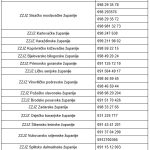As Poslovni Dnevnik/Marija Crnjak wries, when compared to other countries in the Mediterranean and Central Europe, the Croatian healthcare system has relatively good results in the quality of staff, hospital care, emergency care and private care, which was felt and continues to be felt in the coronavirus crisis.
At the same time, electronic regulations in Croatia are very widespread, with 80 percent of prescriptions in pharmacies now being electronic.
However, the mortality rate of patients with acute myocardial infarction is relatively high, which implies that hospital admissions should be of better quality, and waiting lists are a particularly difficult problem, according to a new report by the Italian foundation Fondazione Farmafactoring, supported by the factoring company BFF.
The report is based on statistics and surveys among healthcare staff and users, and data on healthcare debts, waiting lists, services and per capita allocations, all of which have been placed in the context of the pandemic, albeit focusing on the first wave of the pandemic which hit back in the spring of 2020.
The report, which compares nine healthcare systems in the EU (Croatia, the Czech Republic, France, Greece, Italy, Poland, Portugal, Slovakia and Spain), shows that the Croatian healthcare is just behind Italy in terms of healthcare debts, and that in the Czech Republic, although have stabilised finances, the level of available services is much lower than it is in Croatia.
Croatia is the country with the lowest spending on healthcare, although in relative terms it is in third place in terms of its share in GDP, following both Poland and Slovakia. Experts stressed the need for a larger share of private funding and cost sharing.
They also noted unequal access, the late treatment of chronic diseases, poor coordination, and the general overburdening of general practitioners. In addition to that, the geographical distribution of the Croatian healthcare system’s services and other such resources varies greatly across the country, the analysis points out.
One of the main issues concerns the inefficient allocation of resources, which often, instead of planning in advance, concentrates on retrospective loss financing, which is why the BFF has made its services available to institutions in Croatia.
For the latest travel info, bookmark our main travel info article, which is updated daily.
Read the Croatian Travel Update in your language – now available in 24 languages.
Join the Total Croatia Travel INFO Viber community.











